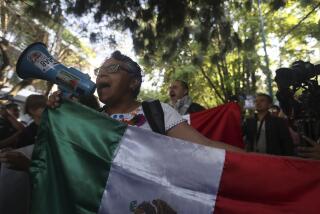U.S., in Switch, Condemns Rights Violations in Chile : Says ‘Quiet Diplomacy’ Didn’t Work
- Share via
GENEVA — The United States, in an unexpected switch of policy, today called publicly on Chile to halt persistent human rights violations, including torture by security forces and police.
Richard Schifter, U.S. delegate to the U.N. Commission on Human Rights, said the demand was made because of Chile’s failure to respond to “quiet diplomacy.”
In the past, the United States has usually abstained or voted against commission resolutions on Chile, considering it a friendly anti-communist country despite previous periods of strained relations over the human rights issue.
At this year’s session, however, Washington presented a draft resolution of its own accusing government and judicial authorities in Chile of failure to prevent “serious” human rights abuses.
The resolution calls on the military government of Gen. Augusto Pinochet to “immediately put an end to all forms of psychological and physical torture by the security and police forces.”
It also demands government action against anyone found guilty of “torture, killings, kidnapings or other human rights violations” and the establishment of “a permanent system to monitor the conduct of the security and police forces.”
Pinochet Talks With Cabinet
In Santigo, Chile, Pinochet met with his Cabinet today to discuss the resolution, but no statement was released. A Foreign Ministry spokesman said there will be no comment until the U.N. commission votes on the resolution.
State Department officials in Washington said the resolution was not prompted by any specific action by the Chilean government, although recent arrests of political opposition figures have exacerbated the situation.
The officials also said the State Department decided this year to change its policy and offer a resolution at the commission out of frustration with resolutions offered in previous years that were “unbalanced” and “strident.”
Schifter said at a news conference that the Reagan Administration has tried to bring about improvements in Chile through “quiet diplomacy.”
“We go public when our quiet entreaties are not responded to,” he said.
Schifter, assistant secretary of state for humanitarian affairs, presented a similar resolution on Ethiopia, where he said quiet diplomacy also failed.
One ‘Positive Development’
The four-page draft resolution on Chile said one “positive development” was the Pinochet government’s decision last year to let a Human Rights Commission official visit the country and talk to anyone he wanted.
But it noted “the persistence of serious human rights violations in Chile,” including “the suppression of fundamental political rights and freedoms through the maintenance of exceptional executive powers.”
It also cited “the ineffectiveness of government and judicial authorities in preventing the recurrence of abuse by security forces” and the “failure of the government of Chile to ensure the thorough investigation and prosecution of the many recent unsolved cases of kidnaping and torture.”
The resolution calls on Chile to “re-establish democratic institutions and the principle of legality essential to the effective enjoyment and exercise of human rights and fundamental freedoms.”
Law and order should be maintained “without resort to excessive use of force” and authorities should stop “using the problem of terrorism as a justification for any abuse of authority against persons engaged in nonviolent opposition,” it said.
The government, it added, must “end the practice of internal banishment” and “allow the return of all Chilean citizens now living abroad who wish to return.”
More to Read
Sign up for Essential California
The most important California stories and recommendations in your inbox every morning.
You may occasionally receive promotional content from the Los Angeles Times.













